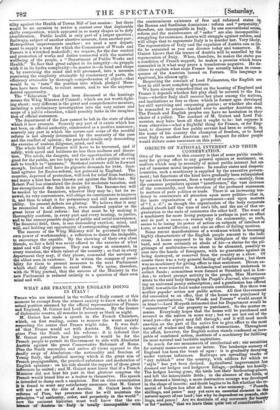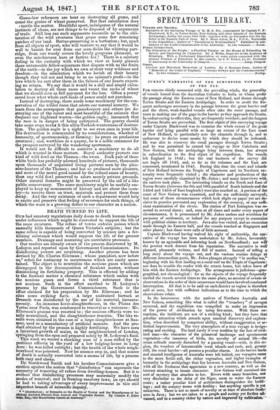OBJECTS OF NATIONAL INTEREST AND THEIR CONSERVATION.
ONE of the wants in this country is that of some public machi- nery for giving effect to any general opinion or sentiment, on matters which may be severally of minor public interest but are yet of immense moral importance. In smaller states and despotic countries, such a machinery is supplied by the executive govern- ment; but functions of the kind have gradually been relinquished by our own Government, from a variety of causes,—mainly, from the common prejudices against "interference," the vast increase of the community, and the devotion of the professed statesmen to matters of pure politics or trade. There is an increasing ten- dency to concentrate all attention upon mere politics—that is, the mere organization of a government—and upon matters of "1. s. d."; as though the organization of the body corporate should absorb half the time of one's life, and the use of that or- ganization to the ends of commerce the other half. The want of a machinery for more living purposes is perhaps in part an effect and in part a cause,—a reason why the community, as such, seems to be losing its power of action on subjects of intellect or taste, or natural affection' and also an effect of failing motives. Some recent manifestations of a weakness which is becoming highly characteristic of the English people amount to the ludi- crous. A house supposed to be the birthplace of the national bard, and more certainly an abode of his—a shrine for the pil- grimage of multitudes—was about to be alienated, possibly to pass into the hands of foreigners, with no guarantee against its being destroyed, or removed from the country as a show. Of course there was a very general feeling of indignation ; but there was no machinery fur giving effect to that sentiment. Divers ex- pedients were resorted to. Archieological societies undertook to collect funds ; committees were formed at Stratford and in Lon- don ; to exhort prompt activity in the people, Miss Martineau wrote to the said body through the People's Journal, also suggest- ing an universal penny subscription; and a gentleman has offered 2,000/. towards the fund -under certain conditions. But there was neither popular action nor public action. All that Government did amounted to an offer, that if the house were purchased by private contributions, "the Woods and Forests" would accept it in trust I—Lord Morpeth intimated that his Department would be " conservator " of the property so purchased. So the matter re- mains. Everybody hopes that the house will be purchased and secured to the nation in some way ; but we are not out of the wood yet—the object may fall through ; and it will need much exertion on the part of the active few to give effect to the most natural of wishes and the simplest of transactions. Throughout the affair, however, the English nation stands confessed as inca- pable of combined action, destitute of a machinery for fulfilling its most natural and laudable aspirations. So much for our monuments of intellectual art : our securities for natural monuments are no better. The landscape scenery of England has been the boast of ages : it is gradually decaying under various influences. Railways are spreading tracks of "dry rubbish" over the country, with edifices for which no "style" has yet been devised. Agricultural improvement has doomed our hedges and hedgerow feliage,—perhaps too hastily. The hedges having gone, the birds lost their harbouring-places, and left the inhospitable fields ; in the absence of the birds, at first deemed a blessing, a more destructive scourge was developed in the shape of insects; and doubt begins to be felt whether the re- moval of hedges has after all been a wise economy. "Pounds, shillings, and pence" may yet save an essential element in the natural aspect of our land ; but why be dependent on pounds shil- lings, and pence? Are we destitute of any reverence for beauty or or "nature," that we leave them quite out of consideration ?
Game-law reformers are bent on destroying all game, and count the grains of wheat preserved. But that calculation does
4 tsettle the matter. Healthful sport, indulgence of the natural instincts of chase, are not things to be disposed of by arguments of trade. Still less can such arguments reconcile us to the obli- teration of the wild creatures that grace some few remaining patches of our land. Battue-preserving is a barbarism; but, apart from all objects of sport, who will venture to say that it would be well to banish for ever from our corn-fields the whirring part- ridge, from our woody covers the lovely gorgeous pheasant, or even the mischievous hare or furtive fox ? There is a salutary feeling in the curiosity with which we view at hasty glances these untameable fellow-sojourners that dispute with us the fruits of the earth—in the joy which we own at their very wildness and freedom—in the admiration which we lavish on their beauty though they toil not and bring to us no spinner's profit—in the love which we cast after them in the fulness of our hearts expect- ing no return. We say that it would be a dull and stupid calcu- lation to destroy all these races and vaunt the sacks of wheat that we should save as full payment for the loss. Often a penny saved loses what whole cart-loads of pence could not purchase. Instead of destroying, there needs some machinery for the con- servation of the wilder races that adorn our natural scenery. We learn from the newspapers that gamekeepers and others are de- stroying one of the rarest and most beautiful of the animals that frequent our highland wastes—the golden eagle • insomuch that the race is in danger of being extirpated. The gentry should take some steps to che At this ultra-Turkish wantonness of destruc- tion. The golden eagle is a sight to see even once in your life. His destruction is commanded by no considerations, whether of humanity, of sportsmanship, or farming : he preys on predacious creatures ; and, worthless as a quarry, he is a noble ornament for the prospect surveyed by the wandering sportsman. It would not be difficult to contrive a machinery to do all which is wanted in these matters. Royal authority protects one kind of wild fowl on the Thames—the swan. Each pair of those white birds has probably adorned hundreds of pictures, thousands upon thousands of unpainted living pictures seen by the plea- sure-hunters of the Thames ; and has so produced more pleasure, and more of the moral good caused by the refined sense of beauty, than any wild fowl preserved to adorn merely private grounds. Other natural features might be preserved by the aid of a like public conservancy. The same machinery might be usefully em- ployed to keep up monuments of history and art about the coun- try—to receive them on trust, maintain and protect them from decay. And the very existence of such a department would help to excite and preserve that feeling of reverence for such things, of which the want is a growing defect in our character as a nation.



























 Previous page
Previous page